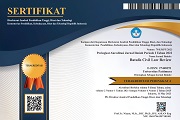The Indissolubility Principle In Saumlaki District Court Decision Number 21 / Pdt.G/2014/PN.Sml
 ), Theresia Nolda Agnes Narwadan(2), Ferdly Renaldy Lerebulan(3)
), Theresia Nolda Agnes Narwadan(2), Ferdly Renaldy Lerebulan(3)
(1) Faculty of Law Pattimura University, Ambon, Indonesia
(2) Faculty of Law Pattimura University, Ambon, Indonesia
(3) Faculty of Law Pattimura University, Ambon, Indonesia
 Corresponding Author
Corresponding Author
Abstract
Keywords
DOI
10.47268/ballrev.v3i2.1016
Published
2022-08-26
How To Cite
@article{BALLREV1016,
author = {Barzah Latupono and Theresia Narwadan and Ferdly Lerebulan},
title = {The Indissolubility Principle In Saumlaki District Court Decision Number 21 / Pdt.G/2014/PN.Sml},
journal = {Batulis Civil Law Review},
volume = {3},
number = {2},
year = {2022},
keywords = {Divorce; Legal Certainty; Principle of Indissolubility},
abstract = {Marriage within the Catholic church recognizes the indissolubility found in Canon 1141, which explains that Catholic marriages are consummatum, unbreakable marriages, cannot be cut off by any human power and for any reason, other than death. The Catholic church is the only religion that strongly rejects divorce and does not acknowledge the effectiveness of court rulings that dissolve the marriage of Catholic couples. This principle provides a consequence for married couples who are Catholic. Divorce is the only way when marital harmony is no more. The concept of divorce between religious teachings and the idea of national law differs especially from that of national law, for it provides an opportunity for a couple to divorce as long as there isa clear and valid reason for the congregation, while the Catholic faith says that only death can separate, since marriage is the sacrament and involves god in it. The kind of legal research conducted is normatif where the law is conceptually defined as what is written in the law law (law in books) and or the law is conceived as a code or custom by which human behavior is deemed feasible, the case approach (case approach) and the conceptual approach of approach (approach). Revered to this research we can see that the state approves divorce proceedings because the state merely wants to give its citizens legal certainty, since the state's job is to provide comfort and safety to its citizens. While this study sees the indissolubility principle harmonizes with the principle of difficulty divorce, however, it is still rarely found the application of the indissolubility principle in national law, since basically religious and state teachings cannot be harmonized.},
issn = {2746-8151}, pages = {152--162} doi = {10.47268/ballrev.v3i2.1016},
url = {https://fhukum.unpatti.ac.id/jurnal/ballrev/article/view/1016}
}
Ali, A. 2002, Menguak Tabir Hukum (Suatu Kajian Filosofis dan Sosiologis), Toko Gunung Agung, Jakarta. Ali, Z. “Hukum Perdata di Indonesia”, Sinar Grafika, Jakarta. Basyir. A. A, 2002, “Hukum Perkawinan Islam”, FH UII, Yogyakarta. Huijbers, T. 1982, “Filsafat Hukum dalam Lintasan Sejara”, Kanisius, Yogyakarta. Kusuma, H. 2007, “Hukum Perkawinan di indonesia menurut ( Perundangan,Hukum Adat da an Hukum Agama)”, Bandung Mandar Maju. Latif, H.M.D. 1981, “Aneka Hukum Perceraian di Indonesia”, Ghalia Indonesia, Jakarta. Prodjodikoro, R.W. 1959, “Hukum Perkawinan Di Indonesia”, Sumur Bandung. Rahardjo. S. 1982, Ilmu Hukum, Alumni, Bandung. Rambe. R, Hukum Acara Perdata lengkap”, Sinar Grafika, Jakarta. Rumokoy , D. A & Maramis.F. 2014, “Pengantar Ilmu Hukum”, Raja Grafindo persada, Jakarta. Marzuki, P. M. 2008, “Pengantar Ilmu Hukum”, Kencana, Jakarta. Mahadi, 2003, Falsafah Hukum Suatu Pengantar, Alumni, cetakan ke-3, Bandung. Muhammad, A. K. 1993, “ Hukum Perdata Indonesia”, PT Citra Aditya Bakti, Bandung. Subekti. 1990, “Ringkasan Tentang Hukum Keluarga Dan Waris", PT. Intermasa Arlima. L. S, 2017, “Perkembangan dan Dinamika Hukum Ketenagakerjaan di Indonesia” , Jurnal Selat 5, No 1. https://ojs.umrah.ac.id/index.php/selat/article/view/215. Rosely , S & Aprilianda S.N. ”Putusan Perkawinan karena Perceraian (Kajian Berdasarkan Hukum Gereja Bagi Perkawinan Kristen di Indonesia”, Jurnal Pascasarjana, FH Universitas Brawijaya, Malang, http://repository.ub.ac.id/id/eprint/156362 Latupono. B dkk. 2021, “Penyuluhan Hukum tentang Keabsahan Perkawinan Pada Masyarakat di Kecamatan TNS Kabupaten Maluku Tengah”, AIWADTHU, Jurnal Pengabdian Hukum, Fakultas Hukum Universitas Pattimura, Volume 1 Nomor 1, https://fhukum.unpatti.ac.id/jurnal/aiwadthu/article/download/491/257 Latupono. B. 2018, “Pencatatan Perkawinan di Indonesia Dikaitkan dengan Good Governance”, Jurnal SASI, Fakultas Hukum Universitas Pattimura, Volume 24 nomor 2, https://fhukum.unpatti.ac.id/jurnal/sasi/article/download/129/47
| Dublin Core | PKP Metadata Items | Metadata for this Document | |
| 1. | Title | Title of document | The Indissolubility Principle In Saumlaki District Court Decision Number 21 / Pdt.G/2014/PN.Sml |
| 2. | Creator | Author's name, affiliation, country | Barzah Latupono; Faculty of Law Pattimura University, Ambon; Indonesia |
| 2. | Creator | Author's name, affiliation, country | Theresia Nolda Agnes Narwadan; Faculty of Law Pattimura University, Ambon; Indonesia |
| 2. | Creator | Author's name, affiliation, country | Ferdly Renaldy Lerebulan; Faculty of Law Pattimura University, Ambon; Indonesia |
| 3. | Subject | Discipline(s) | |
| 3. | Subject | Keyword(s) | Divorce; Legal Certainty; Principle of Indissolubility |
| 4. | Description | Abstract | Marriage within the Catholic church recognizes the indissolubility found in Canon 1141, which explains that Catholic marriages are consummatum, unbreakable marriages, cannot be cut off by any human power and for any reason, other than death. The Catholic church is the only religion that strongly rejects divorce and does not acknowledge the effectiveness of court rulings that dissolve the marriage of Catholic couples. This principle provides a consequence for married couples who are Catholic. Divorce is the only way when marital harmony is no more. The concept of divorce between religious teachings and the idea of national law differs especially from that of national law, for it provides an opportunity for a couple to divorce as long as there isa clear and valid reason for the congregation, while the Catholic faith says that only death can separate, since marriage is the sacrament and involves god in it. The kind of legal research conducted is normatif where the law is conceptually defined as what is written in the law law (law in books) and or the law is conceived as a code or custom by which human behavior is deemed feasible, the case approach (case approach) and the conceptual approach of approach (approach). Revered to this research we can see that the state approves divorce proceedings because the state merely wants to give its citizens legal certainty, since the state's job is to provide comfort and safety to its citizens. While this study sees the indissolubility principle harmonizes with the principle of difficulty divorce, however, it is still rarely found the application of the indissolubility principle in national law, since basically religious and state teachings cannot be harmonized. |
| 5. | Publisher | Organizing agency, location | Faculty of Law, Universitas Pattimura |
| 6. | Contributor | Sponsor(s) | |
| 7. | Date | (YYYY-MM-DD) | 2022-08-26 |
| 8. | Type | Status & genre | Peer-reviewed Article |
| 8. | Type | Type | |
| 9. | Format | File format | |
| 10. | Identifier | Uniform Resource Identifier | https://fhukum.unpatti.ac.id/jurnal/ballrev/article/view/1016 |
| 10. | Identifier | Digital Object Identifier | 10.47268/ballrev.v3i2.1016 |
| 11. | Source | Title; vol., no. (year) | Batulis Civil Law Review; Vol 3, No 2 (2022): VOLUME 3 NOMOR 2, NOVEMBER 2022 |
| 12. | Language | English=en | en |
| 13. | Relation | Supp. Files | |
| 14. | Coverage | Geo-spatial location, chronological period, research sample (gender, age, etc.) | |
| 15. | Rights | Copyright and permissions | Copyright: Authors who publish their manuscripts in this Journal agree to the following conditions: 1. The copyright in each article belongs to the author, as well as the right to patent. 2. Authors are able to enter into separate, additional contractual arrangements for the non-exclusive distribution of the journal's published version of the work (e.g., post it to an institutional repository or publish it in a book), with an acknowledgment of its initial publication in this journal. 3. Authors are permitted and encouraged to post their work online (e.g., in institutional repositories or on their website) prior to and during the submission process, as it can lead to productive exchanges, as well as earlier and greater citation of published work. 4. Authors have the right to self-archiving of the article (Author Self-Archiving Policy)
Licence : Batulis Civil Law Review Journal is disseminated based on the Creative Commons Attribution-NonCommercial 4.0 International license terms. This license allows anyone to copy and redistribute this material in any form or format, compose, modify, and make derivatives of this material for any purpose. You cannot use this material for commercial purposes. You must specify an appropriate name, include a link to the license, and certify that any changes have been made. You can do this in a way that is appropriate, but does not imply that the licensor supports you or your use.
|
Copyright (c) 2022 Barzah Latupono, Theresia Nolda Agnes Narwadan, Ferdly Renaldy Lerebulan

This work is licensed under a Creative Commons Attribution-NonCommercial 4.0 International License.

 : 1958 times
: 1958 times Download : 1226 times
Download : 1226 times














